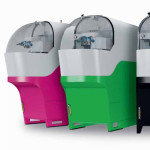Why large companies should think like a small business
 Steven W. Korn, former Vice Chairman of CNN and veteran executive, and Suren Gupta, Allstate technology executive, recognize the need for large companies to innovate and adapt as efficiently as their smaller counterparts.
Steven W. Korn, former Vice Chairman of CNN and veteran executive, and Suren Gupta, Allstate technology executive, recognize the need for large companies to innovate and adapt as efficiently as their smaller counterparts.
Technological innovation in modern business is coming from a great number of nimble startups. Twitter changed media, WhatsApp has changed messaging, Netflix made Blockbuster obsolete, and Warby Parker changed the online/retail model.
Each one of these startups had major competition. Yet they have thrived by being able to adapt to technological shifts faster and more efficiently than their larger competitors.
“A business’s ability to adapt to new technology depends on leadership, culture, and the nature of the business itself. Technological advancements can alter industries significantly, forcing businesses to adapt rapidly. If they fail to adapt, they will lose customers, fall behind their more nimble or newer competitors, lose market share and, eventually, they will die,” said Steven W. Korn.
It’s not necessarily the size of the business, but its focus and mindset that dictates its ability to innovate. Typically, larger organizations take longer to adapt because there are more layers of management and longer approval processes. It’s like trying to change the course of an aircraft carrier as opposed to a speedboat (or startup).
Flat organizations, which are being adopted by some larger companies, reduce layers of management. One of the main reasons for this change in management philosophy is the desire to spark more innovation in an organization.
There are other ways large organizations promote innovation, such as keeping teams small and giving them autonomy. Amazon CEO Jeff Bezos has a simple rule for work teams – they should be fed by no more than two pizzas. The larger a group is, the more difficult it will be to find consensus and move forward efficiently.
Craft beer isn’t a technological innovation, but it is an appropriate example. Larger companies have acquired smaller brewers and introduced their own craft beers.
Successful craft brewers developed strong regional relationships and create a community. The relationships are so strong that many community members will not buy craft beer from a large organization. Apple built a similar brand loyalty when they were a small company, long before iPods and iPhones swept the market.
Being able to create or tap into a community is an underrated component of professional innovation and adaptability.
Technology also plays a critical role in innovation. Suren Gupta, Allstate’s executive vice president of technology and operations, said in The Chicago Tribune, “In most companies, innovation is driven by business ideas for what the company wants to do. That drives technology development. But technology also should drive some of the businesses. We need to have a balance.”
How an organization is structured, how it markets, how it listens to consumers, and how it approaches technology all contribute to its ability to innovate. Leaner startups have the advantage, but it’s not impossible for large companies to adapt responsibly and innovate proactively.
“If a business is able to foster a culture of innovation and reinforce the vital importance of anticipating and adapting to significant trends, even a large firm can prosper and grow in changing environments,” said Korn.
By Jeff Barrett
Source: allbusiness.com








